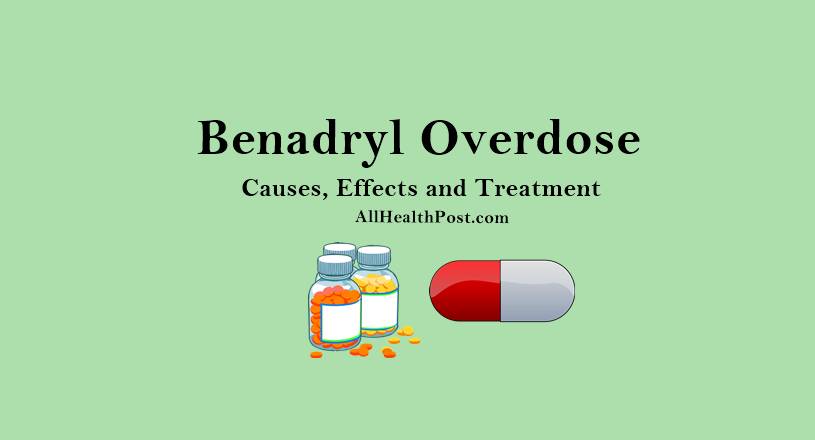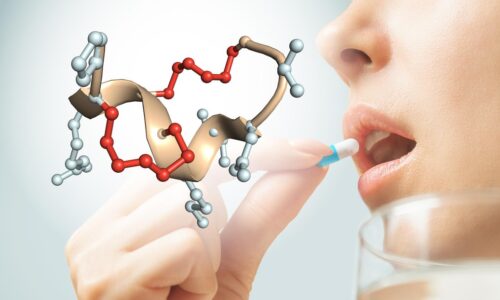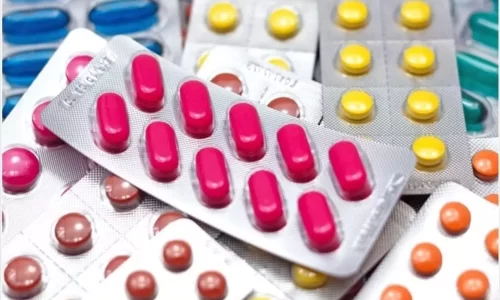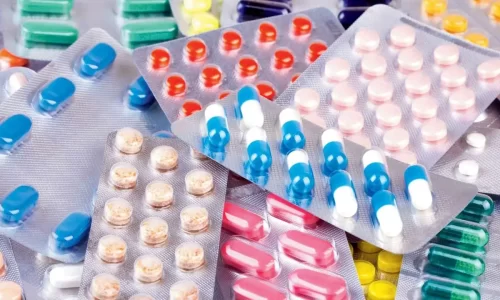Severe cold, itchiness, allergies, hives, URI symptoms or motion sickness – are you suffering from any of these symptoms? Diphenhydramine or Benadryl is a cure-all medicine also known as a histamine blocker that acts as a countermeasure to all types of allergies. The drug is easily available over the counter in various forms – tablets, capsules, liquid syrups, etc.

Topics Covered
What is Benadryl used for?
Benadryl or Diphenhydramine is an antihistamine medicine that cures symptoms of allergies, insomnia, hay fever, and the common cold. You can use Benadryl to treat the following ailments as well:
- Sneezing
- Itchiness
- Red eyes
- Watery eyes
- Hives
- Rashes
- Motion sickness
- Mild Parkinson’s disease
- Vomiting and nausea
- dizziness
- Other forms of allergies
The medicine blocks natural substances such as histamine that is developed during allergic reactions. It also blocks acetylcholine in patients suffering from a runny nose and watery eyes.
The Optimal Dosage of Benadryl
1. For children upto 6 years
Benadryl has not been proved to be completely safe for children below 6 years of age. Unless specified by the paediatrician, avoid using Benadryl for children. However, if prescribed, clinically a child is allowed upto 100mg of Benadryl only.
2. For patients above six years
Benadryl tablets and capsules are not safe for children below 12 years of age unless prescribed by the doctor.
The medicine must be taken under severe conditions and as prescribed by the physician. Benadryl may cause severe symptoms with overdose. Reports show that Benadryl has high toxic effects on patients. Thus, it is recommended to take medicine according to the prescription.
Can you overdose on Benadryl?
If you take doses exceeding the prescribed amount, you can overdose on Benadryl. Though Benadryl is an OTC medicine, you cannot take the medication more than the recommended dosage. Larger doses may lead to a potential risk to vital organs in your body.
Different Causes of Benadryl Overdose
The most common cause of any drug overdose is excessive oral consumption exceeding the limit of doctors prescribed dosage. Although this can happen to patient of any age group, but the cause might be different.
Age
Children below the age of 6 are prone to the over dosage due to the treatment of respiratory infections and otitis media, whereas elder population might get affected due to excessive use of the drug without proper doctor prescribed dosage.
Race
Caucasians are known to be more sensitive to the effects caused by Benadryl than Asians. This is because of quick acetylation of diphenhydramine, main ingredient of Benadryl.
Symptoms of Benadryl Overdose
The most common symptoms of Benadryl overdose that require immediate action are:
1. Anti-Cholinergic Symptoms
- Flushed, Hot, dry skin
- Dry mucous membranes
- Low-grade fever
- Dilated pupils
- Less sweating
- Blurred vision
- Sinus tachycardia
- Intestinal ileus
- Urinary retention
2. CNS Effects
- Epileptic patients suffering from repeated seizures
- Lethargy
- Somnolence
- Catatonic stupor
- Toxic psychosis
- Coma
- Extrapyramidal symptoms
- Heightened anxiety
3. Cardiac Effects
- Cardiogenic shock
- Sinus tachycardia
- Ventricular tachycardia
- Decreasing myocardial contractility
- Hypotension
- Heart blockage due to fall in Sodium conduction
4. Musculoskeletal Symptoms
- Rare occurrence of rhabdomyolysis
5. Pulmonary Symptoms
- Pulmonary edema
6. Integumentary Symptoms
- Infrequent skin eruptions
7. Others
- Nausea
- Diarrhea
- Abdominal pain
The symptoms might be difficult to notice in children or adult. It is recommended to immediately contact health centre in case of minor side effects also.
What does Benadryl overdose feel like?
In drugs like Benadryl, minor overdose does not lead to any severe trouble in adults. However, children must be given measured doses of the drug. Histamine blockers such as Benadryl are considered overdose when it is taken in short interval of time. In certain cases, when the drug is taken with alcohol or any interaction with other medicine, symptoms of overdose are possibly seen.
The drug is considered overdose when taken around 100 tablets of Benadryl or more than 1000mg at one time. Overdose may lead to organ failure or instant death.
Administering first aid in case of Benadryl overdose
An overdose of Benadryl is life-threatening and a critical symptom that demands immediate first aid administration. Incase of overdose, follow the below actions immediately:
- Call nearest health centre immediately for emergency health assistance.
- Call your local poison control centre for further instructions
- Try to determine the amount of overdose, time of consumption, patient’s age, weight and other medications.
- Immediately contact the family doctor and check for any allergies.
- Ensure that the patient is breathing and the pulse is
The medical professional may further perform the following steps towards treating overdose:
- Control fluids using drip lines
- Use laxatives to eliminate the symptoms of Benadryl completely
- Medically manage the critical situation such as fast heart beat rate or low blood pressure.
- Administer activated charcoal to avoid drug absorption in the body
- Perform Gastric lavage to eliminate the drug from the stomach
How to treat Benadryl overdose?
When it comes to the Benadryl overdose, you need to understand that the threat can be fatal and that is the reason why you should waste any time and get started with treatment to save a patient’s life whose is under the effects of Benadryl Overdose. You can prevent your children from taking Benadryl more than the doctor prescribed dosage by administrating the drug yourself and also by keeping the drug out of their reach. Make sure to follow the doctor’s prescription always and you and your family should be safe from the over dosage of Benadryl.
Paramedic Care
Patients are normally treated with intravenous fluids so as to stop dehydration. Doctors suggest cardiac monitoring and benzodiazepines administration to prevent from getting seizures.
Hospital Care
Administration of activated Charcoal
Activated charcoal can be really useful to prevent the drug from getting absorbed to intestines. If the patient is conscious, activated charcoal can be administered by mouth, or else you will need nasogastric tube.
Administration of Intravenous fluids
It’s a saline solution given to the concerning patient. In some cases to maintain the blood pressure, Dopamine is also suggested.
Endotracheal Intubation
In case patients experiencing seizures, Intubation is suggested otherwise the patient may collapse due to respiratory problem.
Physostigmine
Physostigmine is known to be the antidote for the Benadryl overdose. This is an anticholinesterase drug which makes sure to increase the level of acetylcholine. Benadryl has anti-cholinergic effects which normally decreases the level of acetylcholine. Hence this drug can be used as an anti-dote to the over dosage issues.
Administration of Sodium Bicarbonate
It’s a solution given to the patients who are suffering from cardiac toxicity. Although it is recommended to check the sodium level in patient’s blood before administrating the solution in the system.
Administration of Barbiturates and Benzodiazepines
These 2 drugs are popular for the treatment of seizure patients. Although Phenobarbital and Valium are amongst the mostly used drugs for the treatment of seizures caused from the Benadryl Overdose.
Prognosis of Benadryl overdose
Benadryl overdose may lead to possible complications and may cause damage to your nervous system. Below is the possible prognosis of Benadryl Overdose:
- Respiratory disturbances, increased heart rate, hallucination, and anxiety are delirious conditions that may lead to sudden death.
- The prognosis largely depends on the amount of Benadryl consumed, time of consumption, interactions with other medicines, and general health status.
- If the patient survives first 24 hours of overdose diagnostic, it is possibly a good symptom towards recovering.
- Complications such as pneumonia, unconsciousness, lack of breathing or coma may worsen the condition of the patient. This may also lead to brain damage, and oxygen therapy may not work in such conditions.
Prognosis of Benadryl overdose largely depends on the first aid administration as well. In general, the overdose condition is an emergency case that must be handled with care.
Can Benadryl Overdose be Fatal?
According to the studies and researchers, cases related to overdose of Benadryl have been quite common with minor symptoms. Out of the total registered case, only 1% was fatal in regards to Benadryl overdose. It is known that there are chances of long-term effects such as coma, heart blocks, seizure in case of Benadryl overdose. Although the cases of fatality are minimum, it is important to know the symptoms of overdose and take immediate action to save the patient from long-term effects.
Preventing Benadryl overdose
To prevent Benadryl overdose, it is important to take medicine as per the doctor’s recommendation. Apart from that, you must inform your healthcare physician about the following details:
- Increased pressure in eyes or glaucoma
- If you have a stomach ulcer
- Urinating problems, enlarged bladder, or prostate issues
- Hyperthyroidism
- Hypertension or any heart-related problems
- Asthma
- Severe allergies
- If you take heavy alcohol
- Drowsiness or dizziness
Additionally, inform the doctor if you are under heavy medications due to general or severe health problems.
- If you are taking additional cough medicines such as an opioid.
- If you are under the influence of Marijuana
- Alprazolam
- Zolpidem
- Cetirizine
- Chlorpheniramine
- Drugs for anxiety r muscle relaxants
- Herbal products
- Other prescription or nonprescription drugs
Moreover, you must prevent larger dosage than the prescribed amount, intentionally or unintentionally.
Conclusion
Benadryl is an antihistamine OTC drug that effectively cures people of mild allergies and topical conditions. Although fatality is quite rare due to Benadryl Ioverdose, it may lead to critical health conditions. Directions must be followed while taking this serious medicine and avoid mixing the drug with alcohol or Marihuana.
Benadryl overdose may give you an instant high and euphoric experience, but it can be life-threatening as well. Thus, avoid taking larger dose accidentally or intentionally.
Posts You May Like:
- Wellbutrin High: Minimizing the Abuse
- How Long Does Vyvanse Stay in Your System
- Lipitor (Atorvastatin) Side Effects
- Lexapro Escitalopram Oxalate Side Effects
- Adderall (XR) Side Effects for Short Term & Long Term
- Side Effects of Flonase (Nasal Spray)
- How Long Does Adderall Stay in your System?
- Tramadol and Alcohol Interaction Effects
- Can Overdosing Lead to Tramadol High?




